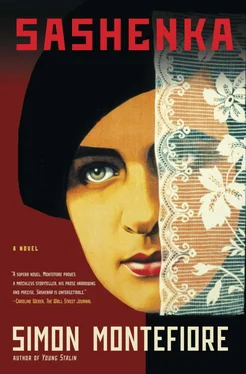Mendel treated Sashenka as an adult; more than a woman, as an adult man , a co-conspirator in the worthiest, most exclusive secret movement in the world. Before long they were meeting almost like lovers, in the twilight, at dawn and in the glowing night, in the stables, in the birch woods and blackberry thickets, on expeditions to collect mushrooms, even whispering by night in the dining hall, sealed within its yellow silk walls that were fragrant with carnations and lilac.
Yes, Sashenka thought now, the road to this stinking prison in the black St. Petersburg winter had started on her father’s fairy-tale estate on those summer nights when nightingales sang and the dusk was a hazy pink. But was she really such a threat to the throne of the Emperor that she should be arrested at the gates of the Smolny and tossed into this hell?
A woman behind Sashenka got up and staggered toward the slop bucket. Somehow she tripped over Sashenka and fell, cursing her. This time Sashenka grabbed the woman’s soft throat, ready to fight, but the woman apologized and Sashenka found she suddenly didn’t mind. Now she was tasting the real misery of Russia. Now she could tell them she did not just know big houses and limousines. Now she was a woman, a responsible adult, independent of her family. She tried to sleep but she could not.
In the sewers of the Empire, she felt alive for the first time.
For his foray into the St. Petersburg night, Zeitlin dressed in a new stiff collar and frock coat to which he attached his star of the Order of St. Vladimir, second class, an honor enjoyed by only a very few Jewish industrialists.
At the bottom of the stairs, pausing for a moment with a hand against the exquisite turquoise tiles of the Dutch stove in the hall, he decided he had better tell his parents-in-law about Sashenka. He knew his wife would not bother. He passed through the empty drawing room and dining room, walled in canary and damask silk, then opened the baize door that led to the so-called Black Way, the dark underbelly of the house. The smell was quite different here, where the air was thick with butter, fat, boiling cabbage and sweat. It gave, thought Zeitlin, a hint of the other, older Russia.
Downstairs lived the cook and the chauffeur, but that was not where he was headed. Instead, Zeitlin started to climb the Black Way. Halfway up he leaned on a doorpost, exhausted and dizzy. Was it his heart, his indigestion, a touch of neurasthenia? Am I about to drop dead? he asked himself. Gideon was right, he had better call Dr. Gemp again.
A hand touched his shoulder and he jumped. It was his old nanny, Shifra, a bone-white specter in an orange housecoat and fluffy slippers who had cared for Sashenka before Lala’s arrival.
“Would you approve the menu today?” she croaked. The household kept up the pretense that old Shifra was still in charge though Delphine now ran the kitchens. Shifra had been retired in tactful stages, without anyone telling her. “I’ve consulted the powers, dear boy,” she added softly. “I’ve glanced into the Book of Life. She’ll be all right. Would you like a hot cocoa, Samoilo? Like the old days?”
Zeitlin nodded at the menu that Delphine had already shown him but refused the cocoa. The old woman floated away like a cobweb on the wind, as silently as she had emerged.
Alone again, he found to his surprise that there were tears in his eyes: it was that sensuous pull of childhood starting in the belly. His house felt suddenly alien to him, too big, too full of strangers. Where was his darling Sashenka? In a blinding flash of panic, he knew that his child was all that mattered.
But then the thousand threads of worldliness and wealth weaved around him again. How could he, Zeitlin, fail to fix anything? No one would dare to treat the girl roughly: surely everyone knew his connection to Their Imperial Majesties? His lawyer Flek was on his way; the Interior Minister was calling the Director of Police, who was calling the Commander of the Separate Corps of Gendarmes, who in turn would be calling the chief of the Okhrana Security Section. He could not bear to think of Sashenka spending the night in a police station, let alone a prison cell. But what had she done? She seemed so demure, so correct, almost too serious for her age.
Parlormaids and footmen lived farther up the Black Way but he stopped on the second floor and opened the metal-lined door that led to the apartment over the garage. Here the smells became more foreign, and yet familiar to Samuil: chicken fat, gefilte fish, frying babke potatoes and the bite of vishniak . Noticing the mezuzah newly nailed to the doorpost, Zeitlin opened the door into what he called “the traveling circus.”
In a large room, filled with precarious piles of books, candelabra, canvas cases and half-opened boxes, a tall old man with a white beard and ringlets, wearing a black caftan and yarmulke, stood erect at a stand facing toward Jerusalem, reciting the Eighteen Benedictions. A silver pointer with an outstretched finger showed his place in the open Talmud. The book was draped with silk, for the holy word could not be left uncovered. This man, Rabbi Abram Barmakid, was not Zeitlin’s father but he was another link to the world of his childhood: this, Zeitlin thought wistfully, is where I came from.
Rabbi Barmakid, once the famous sage of Turbin with his own court and disciples, was now surrounded by sad vestiges of the silver paraphernalia that had previously beautified his prayerhouse and studyhouses. There stood the Ark with its scrolls in velvet covers and silver chains: golden lions with red-beaded eyes and blue-stoned manes kept watch. It was said the rabbi could work miracles. His lips moved quickly, his face seizing the joy and beauty of holy words in a time of disorder and downfall. He had just celebrated Yom Kippur and the Days of Awe camping in this godless house, and the only happy man in it was the one who had lost everything but kept his faith.
In 1915, the Grand Duke Nikolai Nikolaievich, the Commander-in-Chief, had declared all Jews potential German spies and driven them out of their villages. They were given a few hours to load centuries of life onto carts. Zeitlin had rescued the rabbi and his wife, putting them up in St. Petersburg illegally because they had no permits. But while they denounced their godless daughter Ariadna, they were still proud, in spite of themselves, that she had married Zeitlin, a man with oilfields in Baku, ships in Odessa, forests in Ukraine…
“Is that you, Samuil?” a hoarse voice called out to him. In the cupboard-sized kitchen next door he found the rabbi’s wife, Miriam, bewigged and wearing a silk housecoat, stirring a cauldron of soup at an old gas stove with two sideboards, the separation of milk from meat roughly enforced on a sprawl of half-washed kitchenware.
“Sashenka’s been arrested,” said Samuil.
“Woe is me!” cried Miriam in her deep voice. “Before the light, a deeper darkness! This is our punishment, our own Gehenna on earth, for children who all turned away from God, apostates each one. We died long ago and thanks to God, you can only die once. My son Mendel’s a godless anarchist; Ariadna’s lost to God: a daughter who, God protect her, goes out half naked every night! My youngest boy, Avigdor, whose very name is dead to me, abandoned us altogether, long ago—where is he, still in London? And now our darling Silberkind’s in trouble too.” In her childhood Sashenka had been blond, and her grandparents still called her the Silberkind—the silver child. “Well, we mustn’t waste time.” The old woman started to pour honey onto an empty plate.
“What are you cooking?”
“Honeycakes and chicken soup for Sashenka. In prison.”
They already knew, via the household grapevine. Zeitlin almost wept—while he called ministers, the old rabbi’s wife was cooking honeycakes for her grandchild. He could hardly believe that these were the parents of Ariadna. How had they produced that hothouse flower in their Yiddish courtyard?
Читать дальше












